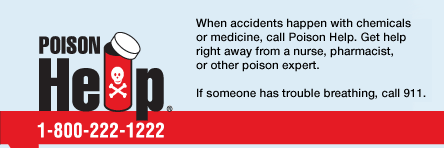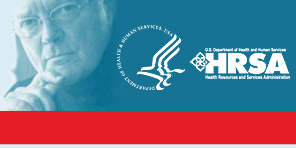
Camera Ready Inserts (PDF, 284 KB)
Visit the Adobe Reader Web site and follow the instructions to download the appropriate version of Adobe Reader for your operating system.
POISON PERVENTION TIPS
PARENTS
• Children learn by imitating adults. When children see adults taking medicine, they may try to do the same thing. Be sure to keep medicines out of sight. Keep them out of reach and locked up.
• Lock up all household products and other strong chemicals so children cannot see or reach them.
• Choose products in containers that are hard for children to open. Replace the cap tightly after using a product. Remember that no container can promise to keep children out.
• Products that taste, smell, or look like candy or drinks may attract children. Be sure to keep these products out of sight. Keep them out of reach and locked up.
• Keep medicines and other poisons in the containers they came in.
• Adult medicines, such as those used for diabetes and heart disease, can be dangerous to children.
Information to Leave With The Babysitter
In an emergency, the sitter should have important information handy. Write this information down and show it to the sitter. Keep it near the phone:
-Your child's age and weight
-The names of medicines the child is taking
-Your address and phone number
-The Poison Help number
POISON HELP
1-800-222-1222
PoisonHelp.hrsa.gov
When accidents happen with chemicals or medicine, call Poison Help (1-800-222-1222). Get help right away from a nurse, pharmacist, or other poison expert.
POISON PERVENTION TIPS
OLDER ADULTS
Prescription Drugs
• Make sure your medicines are clearly labeled. Carefully follow the label's instructions. Check the medicine itself before taking it. Look for capsules or tablets that differ from others in the container. Read the label and look at the medicine EVERY TIME you take it.
• Review all your medicines with your doctor or pharmacist. Review them at least once a year or when you start taking a new drug. Do this for all prescription drugs and over-the-counter drugs. Tell the person if you are taking food supplements (like vitamins, minerals, or herbs).
• Never take medicine in the dark. Turn on a light to make sure you take the right medicine and right dose. If you need glasses to read, wear them when taking medicine. Always check the label.
• Take medicines at the proper time. In some cases, a medicine should be taken either before, after, or during a meal. Your doctor or pharmacist can tell you when to take it.
• Never take more medicine than the doctor prescribes. Taking more doesn't mean you will get better faster. And taking too much medicine can harm you.
• Never take other people's prescription drugs. Take only drugs that are prescribed for you.
Over-The-Counter Drugs
• Common over-the-counter drugs include pain medicine, laxatives to cause bowel movement, cold medicines, and antacids for an upset stomach. All of these can cause problems when taken with other drugs.
• To prevent problems, start by reading the label. Reading the label will tell you:
- what the medicine is for (indications)
- how to take the medicine (directions)
- what is in the medicine (contents, or active and inactive ingredients)
- what the unusual effects are (warnings)
- what activities you shouldn't do while taking the drug (precautions)
• Know what types of over-the-counter drugs to avoid taking with your prescription drugs. When in doubt, ask your pharmacist or doctor before using an over-the-counter drug.
• Take medicine at the proper times according to the label. Taking too much of a drug can harm you.
• Compare what's in medicines (active ingredients) before taking two over-the-counter drugs together. Many drugs contain the same active ingredient. You can easily take more than is safe without knowing it.
• Get rid of medicines that have expired or are no longer needed. Ask your local pharmacist how you can return unused, unneeded, or expired prescription drugs to pharmaceutical take-back locations for safe disposal. If this is not available, take the unused, unneeded, or expired prescription drugs out of their original containers. Mix the drugs with an undesirable substance, such as kitty litter, and put them in waterproof containers, such as empty cans or sealable bags, to make sure that they are not found and used by people or animals. Throw these containers in the trash. Your poison center may have updated advice for your area, call 1-800-222-1222.
When Grandchildren Visit
• When children visit your home, keep all medicines and household cleaning products locked up and out of reach.
• Avoid taking medicine in front of young children. They like to do what adults do.
• Give infants and children only medicines that are safe for their age and weight. The label will tell you what the correct dose is.
• Choose products in containers that are hard for children to open. Replace caps tightly after use. Remember that no container can promise to keep children out.
• Call medicine by its proper name. NEVER CALL MEDICINE CANDY.
• Protect children from poisonous household plants. Keep such plants out of reach.
POISON HELP
1-800-222-1222
PoisonHelp.hrsa.gov
When accidents happen with chemicals or medicine, call Poison Help (1-800-222-1222). Get help right awayfrom a nurse, pharmacist, or other poison expert.
POISON PERVENTION TIPS
ADULTS
Household Products and Other Strong Chemicals
• Keep products in the containers they came in. Do not use food containers to store household products and other strong chemicals.
• Store food away from household products and other strong chemicals. This can keep someone from confusing the products.
• Read the label before using these products and follow all directions.
• Never mix household products with other strong chemicals. Doing this can create poisonous gases.
• Turn on fans and open windows when using sprays or products with a vapor or strong smell.
• When spraying household products and other strong chemicals, point the spray nozzle away from people
and pets.
• Wear protective clothing when using bug spray or other spray products. Put on a long-sleeve shirt, long pants, socks, shoes, and gloves. Pesticides, such as flea and tick shampoo and rat poison, can be taken in through the skin. They can be extremely poisonous.
• Stay away from areas that have just been sprayed.
• Remove and wash clothing after using chemicals. Try to avoid skin contact with household products and other strong chemicals. If skin becomes wet, wash right away with soap and water.
• Never sniff containers to find out what's inside them.
• Call Poison Help (1-800-222-1222) for first aid instructions. Do not follow first aid instructions on old product containers. They may be incorrect.
Medicine
• Read directions and warnings on packages before taking medicine. If you have questions about how to use your medicine, ask your doctor or pharmacist.
• Be careful when taking more than one kind of drug. Doing so can be risky.
• Some medicines should not be taken with food, alcohol, or other medicines. Tell your doctor about all medicines you are taking, including prescription and over-the-counter drugs.
• Talk to your doctor before taking any food supplements, such as minerals or herbs.
• Turn on a light when taking medicine at night. Never take medicine in the dark.
• Some pharmacies will take back drugs you don't need or that have expired. Ask your pharmacist how you can return such drugs for safe disposal. If this service is not available, take the unused, unneeded, or expired prescription drugs out of their original containers. Mix the drugs with an undesirable substance, such as kitty litter, and put them in waterproof containers, such as empty cans or sealable bags, to make sure that they are not found and used by people or animals. Throw these containers in the trash. Your poison center may have updated advice for your area, call 1-800-222-1222.
• Never take other people's prescription drugs. Take only those that are prescribed for you. Never share
prescription drugs.
POISON HELP
1-800-222-1222
PoisonHelp.hrsa.gov
When accidents happen with chemicals or medicine, call Poison Help (1-800-222-1222). Get help right awayfrom a nurse, pharmacist, or other poison expert.
POISON PERVENTION TIPS
HEALTH PROFESSIONALS
• Health Professionals can call Poison Help (1-800-222-1222) anytime to get help with questions about treating a patient who has been poisoned. Calling 1-800-222-1222 connects you to your local poison centers' experts.
• Poison centers are THE PLACE TO CALL to get expert help with assessment, diagnosis and treatment of poisonings. They can also help identify local poisoning trends.
• Many poison center workers are involved in cutting-edge research on poisonings.
• Poison centers have the most up-to-date research on toxicology, the science of poisons. They also have current information on new products and treatments.
• The American Association of Poison Control Centers has one of the most complete resources on poisoning
data. They know where, when, and how poisonings occur. For more information, visit www.aapcc.org.
• Call Poison Help (1-800-222-1222) for materials to offer patients in your waiting rooms.
POISON HELP
1-800-222-1222
PoisonHelp.hrsa.gov
When accidents happen with chemicals or medicine, call Poison Help (1-800-222-1222). Get help right away from a nurse, pharmacist, or other poison expert.
INFORMATON TO LEAVE FOR THE BABYSITTER
Child's Age:
Child's Weight:
Medication the Child is Currently Taking:
Address:
Phone:
Additional Info:
POISON HELP
1-800-222-1222
PoisonHelp.hrsa.gov
When accidents happen with chemicals or medicine, call Poison Help (1-800-222-1222). Get help right away from a nurse, pharmacist, or other poison expert.
|



